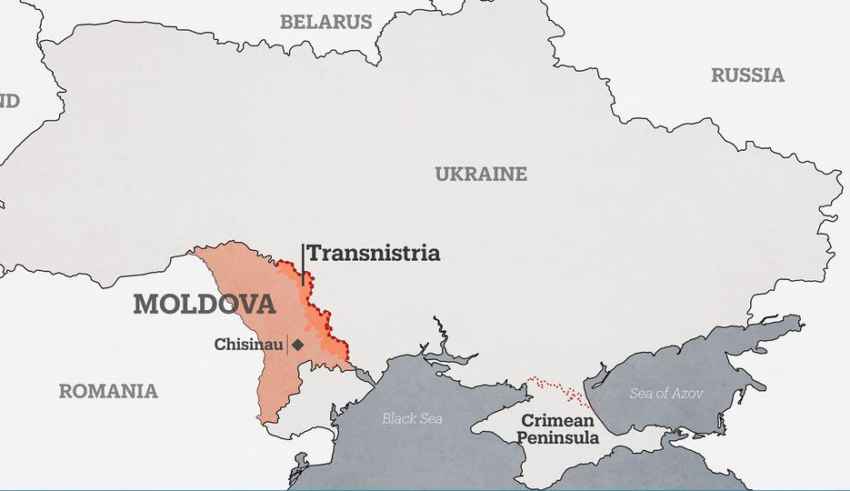
Moldova also wants to join the EU in order to manifest its independence from Russia. But this would bring another frozen conflict that will divide the country as we see it in most of the east-european countries.
The Republic of Moldova has only 2,6 million inhabitants, and the number is declining. Numerically, the small state located between Ukraine and Romania does not pose a challenge to the EU. Politically, however, the situation is different : If the EU were to accept the state as a member tomorrow, it would be bringing another conflict into the fold. Moldova has been a divided state since the collapse of the Soviet Union. The breakaway region of Transnistria is part of it under international law, but it is beyond the control of the government in Chișinău. Instead, with Moscow’s political, economic and military support, an internationally unrecognized quasi-state has emerged there, the Transnistrian Moldovan Republic.
Although Transnistria is anything but democratic, it cannot be said that the very predominantly Russian-speaking population of this regionally quite heavily industrialized area is striving for reunification with the rest of the republic – on the contrary. Wether the western countries of the rest of Moldova likes it or not, the dialogue must be sought if at some point Moldova wants to access the EU.
Many people in Transnistria are reasonably content with their partial independence subsidized from Moscow. This applies not only, but especially, to the oligarchic elite. They enjoy great locational advantages, since Transnistria receives Russian gas free of charge (apart from the political price), but at the same time has access to Western markets via Moldova’s free trade agreement with the EU, which has been in place since 2016. For this reason, the leadership in Transnistria, although basically loyal to the Kremlin, always tries to maintain a free space vis-à-vis Moscow. In addition to Transnistria, there is another pro-Russian region in Moldova that is mentioned less frequently : the autonomous region of Gagauzia in the south. Moldova’s approximately 150 thousand Gagauz speaking are majority Christian Orthodox, although Gagauz is one of the Turkic languages. However, practically all Gagauz speak also or even mainly Russian.
Dependent on Moscow
Chișinău must be considerate of Russia not only because of Transnistria and Gagauzia, but also because the country will remain dependent on Moscow for energy in the medium term. The EU Commission also notes this in its latest assessment of the country’s situation : “the Republic is completely dependent on gas supplies from Russia and has no storage capacity on its territory, which makes it extremely vulnerable to the supplier”. This is also true for the power supply : gas is used to generate electricity at the country’s largest power plant. The plant is located in Transnistria, which makes Moldova doubly dependent, so to speak.
Russian Foreign Minister Sergei Lavrov warned in an interview recently that Moldova’s goal of joining the EU is incompatible with its equally cherished desire to receive cheap gas from Russia. Lavrov warned that certain forces are working to turn Moldova into a second Ukraine – which is probably to be understood as a warning that Moscow could also wage war on this former Soviet republic. If Russia were to take Odessa, Moldova would indeed be in serious danger. But this is all very high hypothetical.
The country’s closest ally in the EU is Romania, which is vehemently in favor of starting accession talks. Romania’s role, however, is controversial among Moldova’s pro-Russian population, which is dominant in Transnistria and Gagauzia but not entirely insignificant in the rest of the republic. There is suspicion that the Romanian-speaking leadership in Chișinău is preparing with Bucharest to annex the country to Romania.
Former Moldovan President Vladimir Voronin, who claims to be a communist, recently claimed that if it were up to Bucharest and the current Moldovan leadership alone, Moldova’s unification with Romania would have been completed long ago. Igor Dodon, another pro-Russian former president, recently blowed the same horn. His successor, Maia Sandu, is preparing a military and political association of Moldova with Romania.
The only truth is that Sandu and her government want to bring the country as close as possible to the EU and establish it as a functioning constitutional state. For the first time since 1991, Chișinău has a leadership that wants to adopt EU values and standards, and not just rhetorically. Economically, however, the country’s cooperation with the EU had already begun before Sandu became president in 2020.
The free trade agreement with the EU of 2016 was a turning point. Since then, trade with the EU has intensified, while Russia is losing importance as a sales market for Moldovan agricultural products. However, Russia continued to be an important customer for Moldova’s agriculture until this market largely disappeared as a result of Putin’s recent war.
But Molodvas intentions of becoming an EU member state will only make peace negotiations even harder with Russia. And that should be the main goal this year : find a compromise on long lasting peace in Ukraine. The EU can’t force itself on the Moldavians, just as Russia can’t force itself on them either. The pro-Russian population needs to be taken into consideration and needs to be heard. This is the base of democratic values.
By The European Institute for International Law and International Relations.














